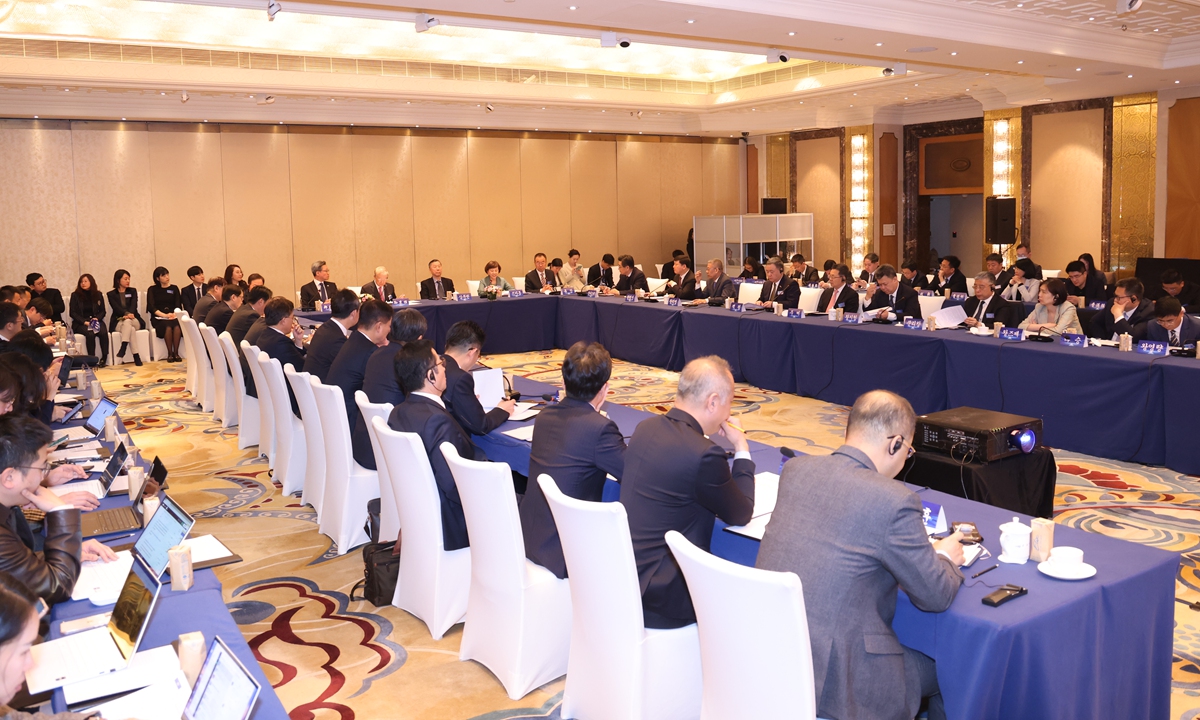S.Korean business group visits China to seek closer ties

Delegations from South Korean and Chinese enterprises attend a meeting in Beijing on March 19, 2024. Photo: Courtesy of CICPMC
A Korea Enterprises Federation (KEF) delegation visited China on Tuesday for talks aimed at strengthening business ties and resolving trade and investment issues. The visit underscores efforts by the two countries in deepening economic cooperation and fostering regional and global development amid changes in bilateral trade.
Experts said that the visit reflects South Korea's emphasis on the Chinese market, as it aims to maintain trade relations and adjust its policies to strengthen trade ties with the Chinese market, and maintain supply chain stability.
High-level executives from some major South Korean enterprises such as Samsung, SK and Hyundai Motor are in attendance, alongside their Chinese counterparts from enterprises including China National Petroleum Corp, China Everbright Bank and YTO Express, as well as Chinese officials, according to information that the China International Council for the Promotion of Multinational Corporations (CICPMC) shared with the Global Times on Tuesday.
The meeting aimed to strengthen ties between the Chinese and South Korean business communities, and to address trade and investment issues, deepen economic and trade cooperation and expand bilateral investment, according to the CICPMC.
The meeting came amid recent fluctuations in bilateral trade of the two countries.
According to the General Administration of Customs, the total import and export trade between China and South Korea in 2023 was $310.74 billion, a year-on-year decrease of 13.5 percent. Among them, China's exports to South Korea in 2023 were $148.99 billion, a year-on-year decrease of 7.2 percent, and China's imports from South Korea were $161.75 billion, a year-on-year decrease of 18.7 percent.
The meeting showed optimism among South Korean business groups regarding China's economic prospects for the year, as they expressed keen interest in strengthening economic and trade cooperation, Li Tianguo, an associate professor at the National Institute of International Strategy of the Chinese Academy of Social Sciences, told the Global Times on Tuesday.
At the meeting, both China and South Korea listed the industrial and supply chains as a major topic. China is the main market for many South Korean products and is also the core supplier of raw materials for South Korea's production of lithium batteries, electric vehicle motors and other products.
However, under the President Yoon Suk-yeol administration, South Korea actively responded to the "Indo-Pacific Economic Framework" of the US and strengthened supply chain cooperation with Washington in semiconductors, batteries and other fields.
Such a move with "small yard, high fence" practices had an adverse impact on China-South Korea economic and trade relations, as in some high-tech fields, South Korea is trying to reduce its dependence on China's supply chain.
"However, whether it is semiconductors or lithium batteries, China plays a pivotal role in the supply chain. Every time South Korea emphasizes the topic of supply chains, it reflects the importance of China." Zhang Huizhi, a vice dean of the Northeast Asian Studies College at Jilin University, told the Global Times on Tuesday.
The emerging field of cross-border e-commerce is witnessing closer bilateral cooperation, with South Korea's customs data indicating a 70.3 percent surge in imports of e-commerce packages from China in 2023, totaling 88.815 million yuan.
However, Chinese e-commerce platforms, such as AliExpress, Temu and Shein, are facing challenges in South Korea, where they will be required to hire domestic representatives, as required by a South Korean business regulator.
This development, focusing on limiting the fast expansion of these platforms, has been highlighted by Chinese experts as a potential challenge to economic and trade cooperation between the two neighboring countries.
Bilateral trade between the two countries grew 2.9 percent to 336.92 billion yuan ($47.41 billion) in the first two months of 2024, with imports from South Korea up 12.3 percent to 186.47 billion yuan.
Photos
Related Stories
- S. Korean activists clamor for end to military exercise with U.S.
- S. Korea, U.S. kick off joint military exercise increasing regional tension
- SK should go forward, not backward, to expand Chinese market despite US wedge
- China firmly opposes the ROK inviting the Taiwan authorities to the so-called Summit for Democracy: spokesperson
- S.Koreans lined up to bid farewell to giant panda Fu Bao, who will return to China in early April
- China urges S.Korea to refrain from hyping up SCS issue
Copyright © 2024 People's Daily Online. All Rights Reserved.









